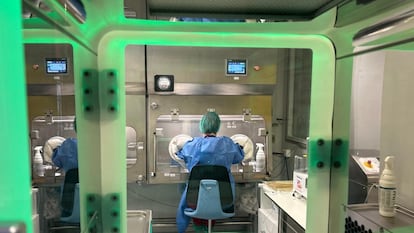A CAR-T therapy saves a girl with a rare autoimmune disease at La Paz Hospital for the first time in the world.


Anti-MD5 dermatomyositis is a very rare disease that affects the immune system in one person per million inhabitants. It is characterized by rapidly causing severe lung damage that kills between 30 and 66% of patients, and there are no specific treatments. Now, La Paz University Hospital in Madrid has successfully treated a girl with this disease using CAR-T therapy, the first time this has been achieved worldwide. The case has been published in the medical journal Med .
CAR-T therapies are a type of personalized immunotherapy that has been very successful in the treatment of cancer, primarily blood tumors such as some leukemias or lymphomas, as a last resort when other treatments have failed. Their mechanism of action consists of modifying the patient's T lymphocytes (a type of white blood cell) so that they recognize and destroy cancer cells. First, the patient's cells are extracted and then genetically modified in the laboratory to express a specific receptor (CAR) against a tumor antigen. They multiply and are injected back into the patient. In the case of an autoimmune disease, T lymphocytes are modified to recognize the CD19 protein, which is found on B lymphocytes, key in the development of many diseases of this type, including dermatomyositis.
The patient from La Paz was treated with CD19 CAR-T therapy, specifically the advanced cell therapy called ARI-0001 produced by the Hospital Clínic de Barcelona. This initiative made a drug that can cost hundreds of thousands of euros more affordable and had not previously been used for an autoimmune disease like anti-MD5 dermatomyositis. The therapy safely restarted the part of the immune system that causes the disease and allowed the patient to remain inactive without the need for further treatments.
The therapy was administered on a compassionate basis given the patient's clinical condition. After the drug was administered, the girl went from taking more than 10 lines of immunosuppressive treatment to taking none at all, and has now been in remission from the disease for a year. The motor impairment, which also accompanies this condition, is progressively improving, and the patient has transitioned from breathing via mechanical ventilation and ECMO (extracorporeal ventricular assist device) to breathing on her own during the day.
As with other autoimmune diseases, the goal is to treat them by chronically administering a generic combination of corticosteroids, immunosuppressants, biologic agents, and chemotherapy, waiting to stabilize the disease. The use of this combination of treatments carries risks, such as an increased risk of infection. However, despite the numerous treatments administered, patients like the one saved in La Paz do not usually respond well, which explains the high mortality rate associated with the disease.
Since their application began in 2011, CAR-T cells have achieved tens of thousands of complete cures in people with blood tumors, but in recent years they have also demonstrated their effectiveness in autoimmune diseases. In 2022, these treatments were applied to people with systemic lupus erythematosus, an autoimmune disease that affects 0.1% of the world's population, especially young women, achieving complete remissions . Spectacular results have also been seen in patients with myasthenia gravis. A 33-year-old patient, who due to progressive paralysis required a wheelchair to move around and a machine to breathe, received CAR-T cells and improved to the point where she was able to ride an electric bike again and complete routes of more than 25 kilometers.
In the future, CAR-T cells are expected to be used against multiple sclerosis. A trial is underway at the Clínic to test whether this immunotherapy can be useful in this disease, which is much more complex than others already treated with this technology.
The success of La Paz University Hospital today was possible thanks to the collaboration of a large number of healthcare professionals from various specialties at the hospital and other institutions such as CRIS, the National Cancer Research Center (CNIO), and the Niño Jesús Hospital.
EL PAÍS


%3Aformat(jpg)%3Aquality(99)%3Awatermark(f.elconfidencial.com%2Ffile%2Fa73%2Ff85%2Fd17%2Fa73f85d17f0b2300eddff0d114d4ab10.png%2C0%2C275%2C1)%2Ff.elconfidencial.com%2Foriginal%2F815%2F2bd%2Fa3d%2F8152bda3d9aae1cde67825d6faed25b5.jpg&w=3840&q=100)


%3Aformat(jpg)%3Aquality(99)%3Awatermark(f.elconfidencial.com%2Ffile%2Fbae%2Feea%2Ffde%2Fbaeeeafde1b3229287b0c008f7602058.png%2C0%2C275%2C1)%2Ff.elconfidencial.com%2Foriginal%2F26e%2F597%2Fb67%2F26e597b67b919f3a4fb239b37e4aa7bd.jpg&w=3840&q=100)